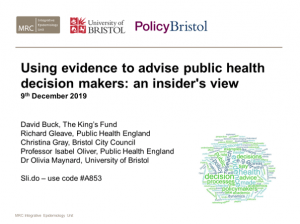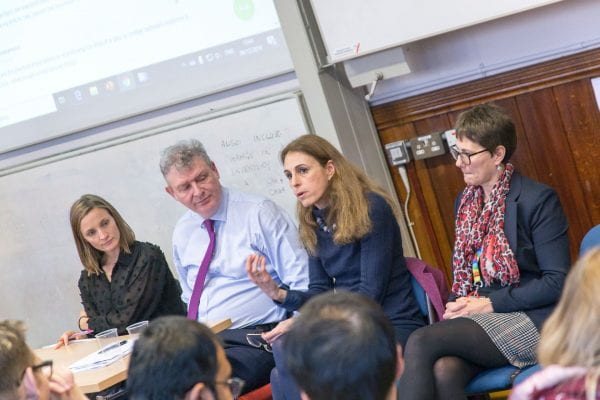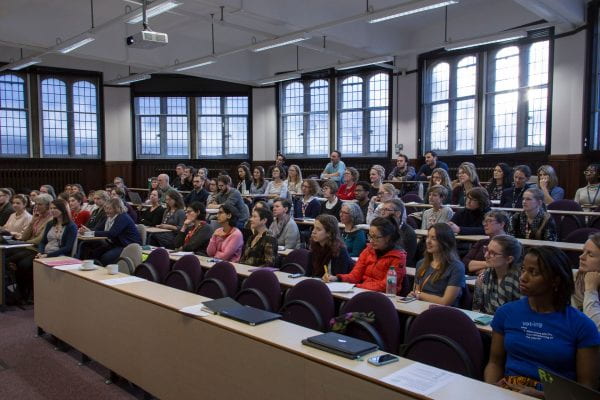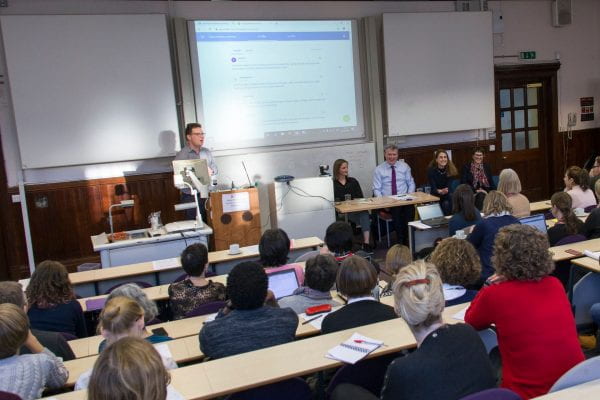 This blog post reviews a recent seminar hosted by the MRC IEU, PolicyBristol and the Bristol Population Health Science Institute.
This blog post reviews a recent seminar hosted by the MRC IEU, PolicyBristol and the Bristol Population Health Science Institute.
Public health is one of the most contested policy areas. It brings together ethical and political issues and evidence on what works, and affects us all as citizens.
Researchers produce evidence and decision-makers receive advice – but how does evidence become advice and who are the players who take research findings and present advice to politicians and budget-holders?
We were pleased to welcome a diverse audience of around 75 multidisciplinary academics, policymakers and practitioners to hear our seminar speakers give a range of insider perspectives on linking academic research with national and local decisions on what to choose, fund and implement.
In this blog post we summarise the seminar, including links to the slides and event recording.
Chair David Buck from The King’s Fund opened the event, highlighting the importance of conversations between different sectors of the evidence landscape, and of local decision-making in this context.
‘The art of giving advice’
The session was kicked off by Richard Gleave, Deputy Chief Executive, Public Health England, who is also undertaking a PhD on how evidence is used in public health policy decision making.
His presentation ‘Crossing boundaries – undertaking knowledge informed public health’ set the context, observing that most academic teams – from microbiology labs to mental health researchers – aim to improve policy and practice; but ‘the art of giving advice is as important and challenging as the skill required to review the evidence’.
Richard then introduced a range of provocations and stereotypes about how the policy decision making process can be framed.
Citing Dr Kathryn Oliver, he encouraged attendees to challenge the idea that there’s an ‘evidence gap’ to be crossed, and instead focus on doing good working together to improve the public’s health.
Giving an example of the Institute for Government’s analysis of how the smoking ban was enacted, he noted the role of a small number of influential groups and individuals in securing a total ban in 2007. He encouraged actively crossing the boundaries between academia, policy and practice, and working with boundary organisations and influencers as part of this process.
‘Partnerships between science and society’
Professor Isabel Oliver gave a second national perspective.
Speaking as a research-active Director of Research, Translation and Innovation and Deputy Director of the National Infection Service, she suggested that ‘Partnerships between Science and Society’ are the key to evidence based public health.
She questioned why is it when we have such an abundance of research, we still don’t have the evidence we need? And why does it take so long to implement research findings? She argued that a key issue here is relevance; how relevant is the research being produced, especially to current policy priorities?
Isabel outlined challenges including:
- Needing evidence quickly in response to public health emergencies, and not being able to access it, for example how to bottle-feed babies during flooding crises, or whether to close schools during flu pandemics
- Mismatched policy and research priorities; e.g. policy needing evidence on the impact of advertising on childhood obesity, but research focusing on the genetics of obesity
- The (unhelpful) prevalence of ‘more research needed’ as a conclusion, and knowing when the evidence is sufficient to make a decision
- A need to develop trust between stakeholders, made more challenging by the frequency of policy colleagues moving roles.
She also questioned whether the paradigm of evidence-based medicine works for complex issues such as public health or environmental policy.
Isabel concluded with some observations; that broader and more collaborative research questions that address the real issues are needed; and collaborating with a broad range of stakeholders, including industry and finance, should not be discounted.
She finished by reiterating a call for public health advice that is relevant, and responds to a policy ‘window’ being open.

Seminar speakers L-R: Dr Olivia Maynard, Richard Gleave, Professor Isabel Oliver and Christina Gray. Image credit: Julio Hermosilla Elgueta
‘Local perspective’
Christina Gray, Director of Public Health at Bristol City Council gave the local view, providing a helpful explanation of her role and the process of decision making within a local authority.
She outlined three key principles:
- The democratic principle; elected members are ‘the council’; officers (including her role) provide advice. Local authorities are close to their people and are publicly accountable. Their decisions are formally scrutinised and need to be justified, and resource allocation is a key – and stark – challenge, especially in the context of austerity.
- The narrative principle: how the society that the authority represents holds multiple legitimate (and competing or conflicting) perspectives and realities, which all need to be considered.
- The (social) scientific principle; the development of human knowledge in a systematic way – which is then shared into the democratic process, as one of a range of narratives.
Christina outlined a case study example of an initiative on period dignity which Bristol City Council is leading as part of Bristol’s One City Plan, and how the evidence base for the programme was located and used. She posed the question of what evidence matters locally, and suggested that evidence of impact, economic evidence, and retrospective evidence that demonstrates whether what has been done works, in order to build on it, are the most helpful. To close, Christina highlighted the importance of being ‘paradigm literate’ in order to navigate the complexity of public health decision making.
Academic perspective
Our final speaker, Dr Olivia Maynard, gave an academic perspective on how to advise decision makers.
Focusing on practical tips, she outlined her own work on tobacco, smoking, e-cigarettes, alcohol and other drugs and how she has engaged with various opportunities to work with policymakers.
Starting with a clear case for doing the work (it’s important, it’s interesting, to create impact), she went on to outline methods of engagement:
- Proactively presenting your work; introduce yourself to policymakers interested in your area such as MPs, Peers, APPGs, subject specialists in parliamentary research services, advocacy groups, and PolicyBristol; review Hansard and Early Day Motions; get involved in parliamentary events
- Respond to calls for evidence (University of Bristol researchers can find curated opportunities via the PolicyBristol PolicyScan)
- Work directly with policymakers, for example via Policy Fellowships (for example with POST)
Olivia outlined some reflections around the differences between academia and policymaking.
Timelines for action is one, but she also used the changes towards plain packaging as an example to note that the policymaking process can span numerous years, presenting many opportunities for intervention.
She referred back to Christina’s point about ‘multiple competing realities’ to highlight that evidence is one of many factors to consider in policymaking.
She also encouraged academics to challenge ‘imposter syndrome’, by emphasising ‘you are more of an expert than you think you are’, and needing to make yourself known to be offered opportunities.
Where next?
Chair David Buck highlighted a number of themes running throughout the presentations including recognising the paradigms used by different stakeholders; questioning what counts as evidence, and being able to provide advice from an uncertain evidence base; and what these themes mean for all of us (and how willing are we to act on these reflections?)
The seminar concluded with a facilitated Q&A session spanning topics such as:
- Should all research which influences policy be coproduced with user groups and policymakers?
- What kind of ‘payback’ do stakeholder organisations need for their involvement in research projects?
- How should researchers develop the skills needed to cross boundaries?
- What funding is available for policy relevant research?
- How can we make our evidence ‘stand out’?
- Should academics have a responsibility to critique policy?
The seminar started numerous conversations which we hope to continue.
Access the slides:
1. Richard Gleave Crossing boundaries – undertaking knowledge informed public health
2. Isabel Oliver Partnerships between science and society
3. Christina Gray Evidence into practice
4. Olivia Maynard An academic’s perspective
View a recording of the event on the IEU’s YouTube channel: https://www.youtube.com/watch?v=-ew-RvzV-D0
Contact lindsey.pike@bristol.ac.uk if you’d like to hear about future events.


